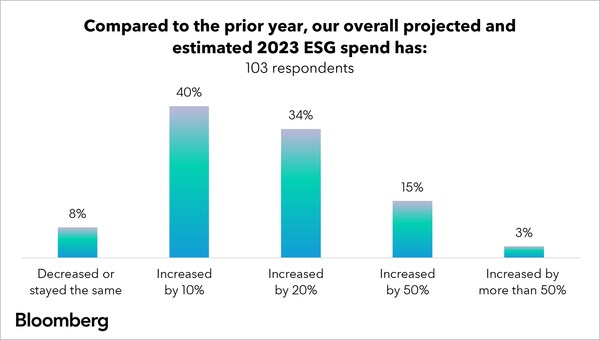The demand for ESG data is on the rise, with more than 9 in 10 leaders planning to increase ESG data spend, according to a new survey.
The research carried out by Bloomberg and Adox of more than 100 portfolio managers, climate risk executives, and data management executives. reveals firms’ priorities for ESG data spend as well as approaches to ESG data acquisition and management.
The study shows that nearly all executives (92%) plan to increase their ESG spending by at least 10%, with 18% planning to increase their spend by 50% or more. The top three areas in which firms are prioritising this spend are ESG benchmarks and indices (29%), company-reported data (23%), ESG scores (20%), and sustainable debt (19%). When asked which criteria were most important for selecting an ESG data provider, data quality ranked first, followed by breadth of coverage.

ESG DATA VALUE
The research, however, highlights a stark contrast among firms in their perception of their ESG capabilities. While most respondents (64%) consider themselves ahead of the competition, nearly 30% acknowledge feeling somewhat or significantly behind. However, respondents are nearly unanimous on one issue: 99% of executives agree their organisations value ESG data, citing its importance to keep pace with their peers (45%), achieve a competitive advantage (44%), and for regulatory compliance (10%).
“Once categorised as an alternative data source, ESG data has quickly become integral to the value financial firms deliver to their clients. Executives are making significant strategic investments in ESG data acquisition and management to differentiate themselves and meet client and regulatory demand,” said Leila Sadiq, Global Head of Enterprise Data Content at Bloomberg. “To help our customers derive meaningful insights from their data faster, we will continue to invest in and deliver high-quality, comprehensive ESG data and analytics that efficiently integrate with existing foundational data giving customers a holistic view of their operations.”
While firms seek to obtain more ESG data, they are also contending with how to best manage it. Over 70% of firms report taking an ad hoc or decentralised approach to acquiring and managing their ESG data. Only about a third of respondents (29%) take a holistic firmwide approach for evaluating, implementing, and rationalizing their ESG data.
ESG DATA CHALLENGES
Given this fragmentation, the most challenging aspects of ESG data management are handling constantly evolving and new ESG data content (55%), managing multiple ESG vendor data feeds (50%), and aligning ESG content to existing entity data (48%). When it comes to technical delivery options for ESG data, cloud is the clear preference for 85% of respondents, followed by Rest API (7%), SFTP/Parquet (6%), and SFTP/Request/Reply (3%).
“As this research confirms, our customers are grappling with the challenge of integrating large volumes of ESG data from multiple sources and the lack of consistency between vendors can lead to data quality issues and operational disruptions,” said Don Huff, Global Head of Client Services and Operations at Bloomberg Data Management Services. “Data License Plus ESG Manager streamlines the acquisition, management, and distribution of data into a customer’s environment of choice, helping them to optimize their data supply chain and outsource vendor change management so they can focus on making efficient ESG investment decisions.”
“While firms are planning for ESG data to become a part of mainstream data and research workflows, they realise that the age of ESG data behaving the same as other financial data sets has not yet arrived. In the meantime, they are prioritizing technical scalability and data transparency to make sure analysts, investors, and regulators have the right tools to select, curate, and enrich existing datasets with key ESG attributes,” said Gert Raeves, Research Director and Founder of Adox Research.
To view the full results of the survey, click here.








































